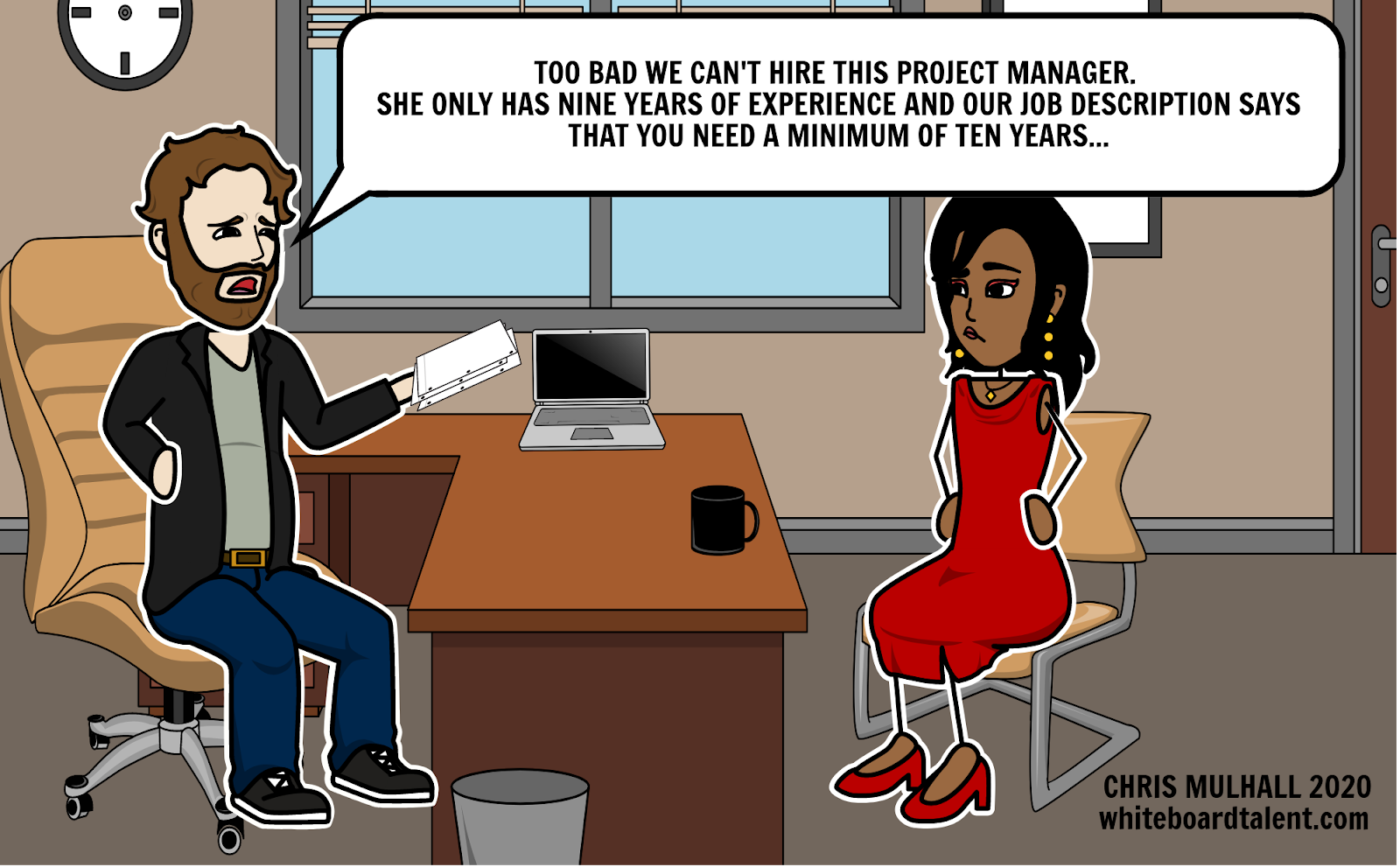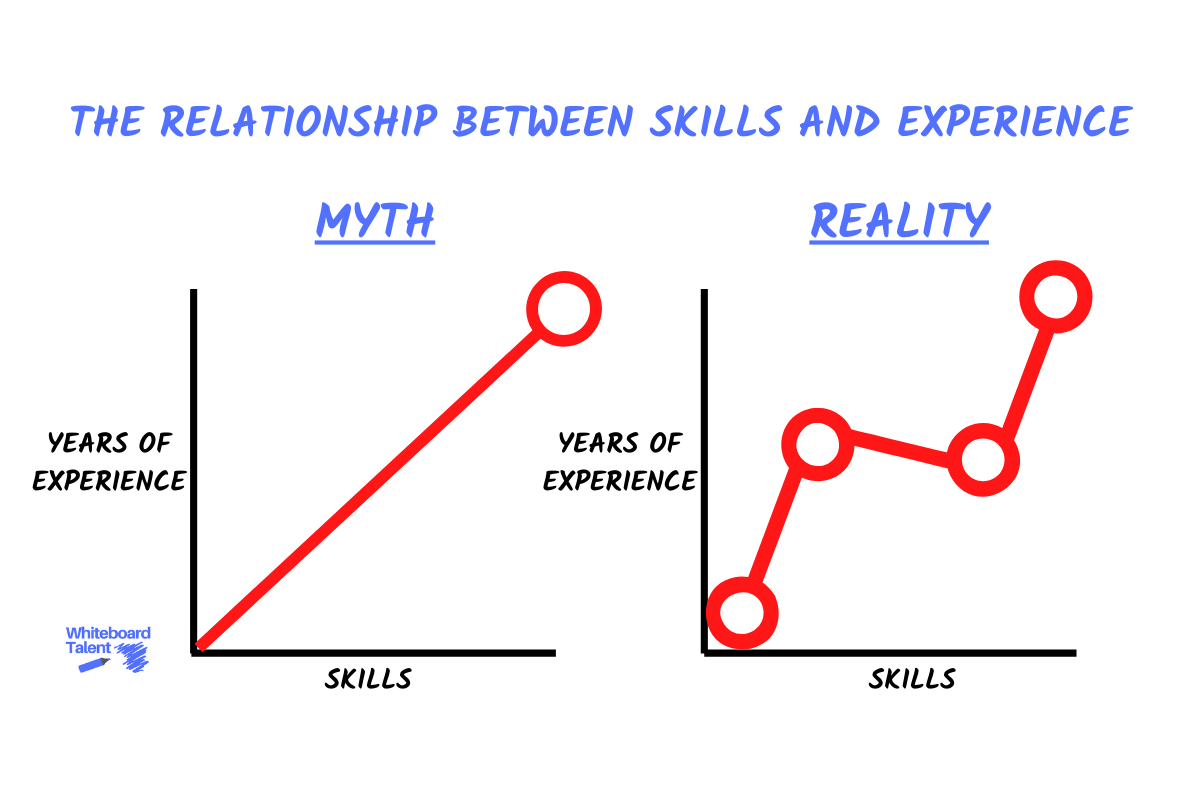It's Time to Remove the Years of Experience Requirements From Your Job Descriptions
Not all "years of experience" are weighted equally. At a high growth organization, it can feel like you're learning in dog years. The breadth and depth of experience gained in one year is comparable to working seven years at a more stagnant company.
Other years feel like Groundhog Day, where you're repeating the same tasks over and over. That's not always a bad thing. Ideally, you have embraced the opportunities to solve recurring challenges better and faster. Although less impactful than dog years, you're still growing and sharpening your saw.
And then there are those times when you add to the years of experience tally, but your skill development flatlines. The next thing you know, you've circled the sun and haven't a clue how you did it or what you accomplished.
So if some years on the job are more meaningful than others, why do we insist on mandating minimum years of experience requirements on our job descriptions?
We shouldn't assume that there's a perfect correlation between the length of time a person has been doing a job and their capability to do it. And yet, as I skim the first 50 of 88,000 Project Manager job postings in the United States on LinkedIn, over 80% have included a minimum years of experience requirement.
Just so we're clear, I don't believe there is a malicious intent when including years of experience thresholds. By asking for at least X number of years completing Y tasks, the Recruiter or Manager is looking to hire a candidate that has solved similar challenges more than once, someone who will be faster to ramp up in a new role.
The more experienced candidate is usually the safer choice. They should recognize patterns faster and, in turn, ask more insightful questions. So it's fair to assume that the easiest way to guarantee a baseline competency is to mandate a minimum years of experience requirement. But when it comes to job descriptions, we are long overdue for challenging conventional wisdom.
If we value the number of years of experience over the quality of those years, we're taking a short-sighted approach to candidate screening. The unintended and negative consequences far outweigh the benefits of setting an arbitrary target for at least "X years of experience."
Here are five reasons why it's time to remove the minimum years of experience requirements from your job descriptions:
Years of experience is a terrible predictor for software proficiency:Just because I've been using Microsoft Excel for 20+ years doesn't make me a spreadsheet guru. At this stage in my career, I'm still shocked when my pivot tables work on the first try. If a level of software proficiency is a requirement for the job, you should state your proficiency level expectations in the job description and assess the capability during the interview stage.
Minimum years of experience thresholds fail to account for learning agility:Most job descriptions focus on the rearview mirror rather than the road ahead. In actuality, advancements in self-directed learning have made it easier than ever to fast track your skill development. Traditional job descriptions incorrectly assume that there's a standard equation for skill development over time - as if years of experience and capability are correlated on a fixed slope.
Exclusive job descriptions have a detrimental effect on gender diversity hiring: According to a research study in the Harvard Business Review, women don't apply for jobs unless they're 100% qualified. If a candidate doesn't meet your minimum qualifications, can you blame them for not applying? As the article states, people (and more often, women), who didn't apply believed that they needed to meet all the qualifications not to do the job well, but to be hired for it in the first place. The downstream impact in the candidate funnel is even more concerning - a separate HBR research study concludes: If There's Only One Woman in Your Candidate Pool, There's Statistically No Chance She'll Be Hired.
A “years of experience” prerequisite rewards quantity over quality: The "dog years" theory highlights the point that your skills in an enriching job will accelerate faster than someone doing the same job with little to no challenge. If one candidate has spent their career immersed in bureaucracy and complacency, remind me again - why are we overvaluing this experience?
Arbitrary job requirements will negatively impact your employer brand: A candidate will make several assumptions about the company culture just from reading the job description. Suppose a company is asking for 12-15 years of experience in X, 7-9 years working with Y technologies, and 3-5 years doing Z type of projects. What is your first impression? Mine is that the organization is risk-averse, process heavy, and unwilling to invest in the learning and development of their employees. Good luck wooing high impact candidates with a job description covered in red tape.
Advice for Job Seekers:
Give the employer the benefit of the doubt:
Even the best companies might have a minimum years of experience threshold on their job descriptions. Don't write them off so quickly. Updating and revamping job descriptions is a tedious task that always takes longer than expected. And in some cases, a years of experience tally might be necessary based on immigration requirements or union agreements. Give the employer the benefit of the doubt until you have had a chance to learn more about the role, which leads to….
Clarify how "qualified" is measured:
If you're interviewing with a Recruiter or Hiring Manager, and their line of questioning begins with, "How many years of experience do you have with X," your ears should perk up. You can certainly ask, "Are you targeting candidates that have a specific number of years of experience, or should I speak to the quality of my experience and the impact I've had working with X?" Their answer will give you plenty of insight into the company culture or your future Manager. From here, the onus is on you, the candidate, to showcase your storytelling skills and mitigate any years of experience gaps.
Advice for Employers:
Focus on quality, not quantity:
Instead of focusing on years of experience thresholds to differentiate your junior, intermediate, or senior-level roles, shift your emphasis to qualitative measures and competency based expectations - foundational skills, leadership attributes, and job specific capabilities. Rather than requesting 2+ years of experience with X, you can ask for hands-on learning or entry-level experience working with X. Instead of 5+ years with Y, you can state that you're looking for proven and recurring success working with Y.
Level the playing field with Situational Interview Questions:
Consider adding Situational Interview Questions to your assessment criteria. Situational questions will ensure that you're evaluating candidates based on how they respond to a real work scenario, regardless of the number of years they've been doing it. If you're unsure how to write effective Situational Interview Questions, you can learn how in my blog post on the topic.
In Closing:
Whether you're a Hiring Manager or Recruiter, it's worth revisiting all of your job descriptions to reword your arbitrary minimum experience thresholds. And if you're trying to convince someone else to embrace this mindset, I suggest that you ask them these three questions:
What would you do if a fantastic candidate with four years of experience applied to your job description that supposedly requires 5+ years?* (*Remember to change the years of experience number based on their current job description).
Did you know that studies have shown that many qualified candidates will never apply to a job unless they meet 100% of the job requirements?
Do you still want to include a minimum year of experience threshold, or can we rephrase the bullet points to focus more on the quality of experience?
Challenge the status quo when crafting your next job description. The most “qualified” candidates will thank you for leveling the playing field.
If you’re in front of the whiteboard and ready to disrupt the talent industry, please subscribe, share, and brainstorm new ideas with me.



